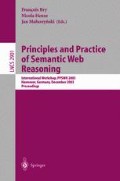Abstract
In natural language, and in some knowledge representation systems, such as extended logic programs, there are two kinds of negation: a weak negation expressing non-truth, and a strong negation expressing explicit falsity. In this paper I argue that, like in several basic computational languages, such as OCL and SQL, two kinds of negation are also needed for a Web rule language.
Access this chapter
Tax calculation will be finalised at checkout
Purchases are for personal use only
Preview
Unable to display preview. Download preview PDF.
References
Berners-Lee, T.: Reaching out onto the web, web document http://www.w3.org/2000/10/swap/doc/Reach
Boley, H., Tabet, S., Wagner, G.: Design Rationale of RuleML: A Markup Language for Semantic Web Rules. In: Proc. Semantic Web Working Symposium (SWWS 2001), Stanford University (July/August 2001)
Decker, S., Dean, M., McGuinness, D.: Requirements and use cases for a semantic web rule language, web document http://www.isi.edu/stefan/rules/20030325/
Gelfond, M., Lifschitz, V.: The stable model semantics for logic programming. In: Kowalski, R.A., Bowen, K.A. (eds.) Proc. of ICLP, pp. 1070–1080. MIT Press, Cambridge (1988)
Gelfond, M., Lifschitz, V.: Logic programs with classical negation. In: Proc. of Int. Conf. on Logic Programming, MIT Press, Cambridge (1990)
Gelfond, M., Lifschitz, V.: Classical negation in logic programs and disjunctive databases. New Generation Computing 9, 365–385 (1991)
Grosof, B.N., Labrou, Y., Chan, H.Y.: A declarative approach to business rules in contracts: Courteous logic programs in XML. In: Proc. 1st ACM Conference on Electronic Commerce (EC 1999), Denver, Colorado, USA (November 1999)
Grosof, B.N.: Prioritized conflict handling for logic programs. In: Maluszynski, J. (ed.) Proc. of the Int. Symposium on Logic Programming (ILPS 1997), MIT Press, Cambridge (1997)
Herre, H., Jaspars, J., Wagner, G.: Partial logics with two kinds of negation as a foundation of knowledge-based reasoning. In: Gabbay, D.M., Wansing, H. (eds.) What Is Negation?, Oxford University Press, Oxford (1999)
Herre, H., Wagner, G.: Stable models are generated by a stable chain. J. of Logic Programming 30(2), 165–177 (1997)
Koerner, S.: Experience and Theory. Kegan Paul, London (1966)
Melton, J., Simon, A.R.: SQL:1999. Morgan Kaufmann, San Francisco (2002)
Pereira, L.M., Alferes, J.J.: Well founded semantics for logic programs with explicit negation. In: Neumann, B. (ed.) Proceedings of the European Conference on Artificial Intelligence (ECAI), pp. 102–106. Wiley, Chichester (1992)
Pearce, D.: Stable inference as intuitionistic validity. Journal of Logic Programming 38, 79–91 (1999)
Pearce, D., Wagner, G.: Reasoning with negative information I – strong negation in logic programs. In: Kusch, M., Haaparanta, L., Niiniluoto, I. (eds.) Language, Knowledge and Intentionality. Acta Philosophica Fennica 49 (1990)
Reiter, R.: On closed-world databases. In: Minker, J., Gallaire, H. (eds.) Logic and Databases, Plenum Press, New York (1978)
van Gelder, A.: Negation as failure using tight derivations for general logic programs. In: Foundations of Deductive Databases and Logic Programming, pp. 149–176. Morgan Kaufmann, San Mateo (1988)
Wagner, G.: A database needs two kinds of negation. In: Thalheim, B., Gerhardt, H.-D., Demetrovics, J. (eds.) MFDBS 1991. LNCS, vol. 495, pp. 357–371. Springer, Heidelberg (1991)
Wagner, G.: Foundations of Knowledge Systems – with Applications to Databases and Agents. Advances in Database Systems, vol. 13. Kluwer Academic Publishers, Dordrecht (1998), See http://www.inf.fu-berlin.de/~wagnerg/ks.html
Wagner, G.: How to design a general rule markup language? In: Proceedings of the First Workshop on XML Technologies for the Semantic Web (XSW 2002). Lecture Notes in Informatics, Berlin (June 2002) Gesellschaft für Informatik. invited paper
Author information
Authors and Affiliations
Editor information
Editors and Affiliations
Rights and permissions
Copyright information
© 2003 Springer-Verlag Berlin Heidelberg
About this paper
Cite this paper
Wagner, G. (2003). Web Rules Need Two Kinds of Negation. In: Bry, F., Henze, N., Małuszyński, J. (eds) Principles and Practice of Semantic Web Reasoning. PPSWR 2003. Lecture Notes in Computer Science, vol 2901. Springer, Berlin, Heidelberg. https://doi.org/10.1007/978-3-540-24572-8_3
Download citation
DOI: https://doi.org/10.1007/978-3-540-24572-8_3
Publisher Name: Springer, Berlin, Heidelberg
Print ISBN: 978-3-540-20582-1
Online ISBN: 978-3-540-24572-8
eBook Packages: Springer Book Archive

